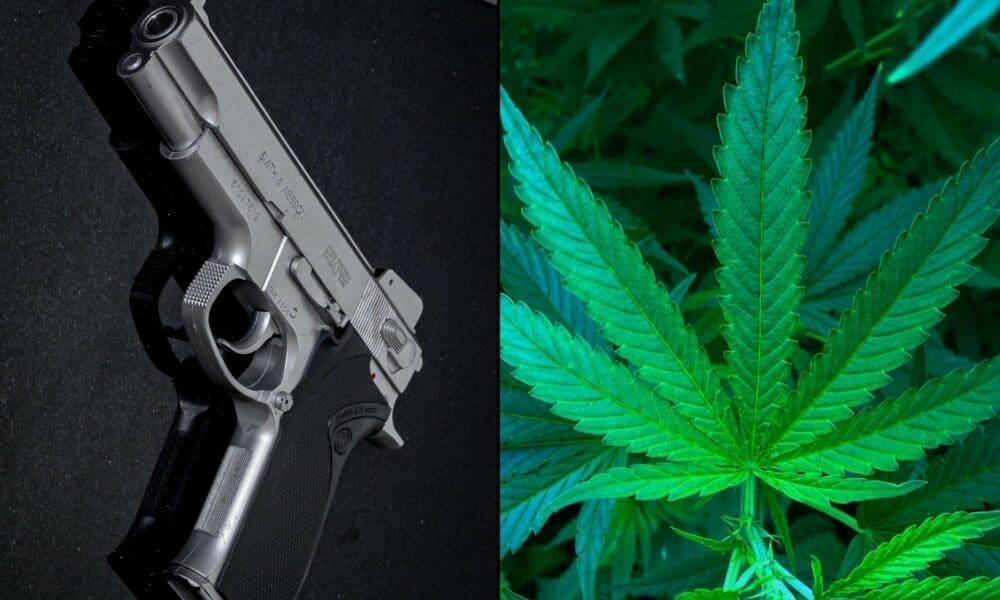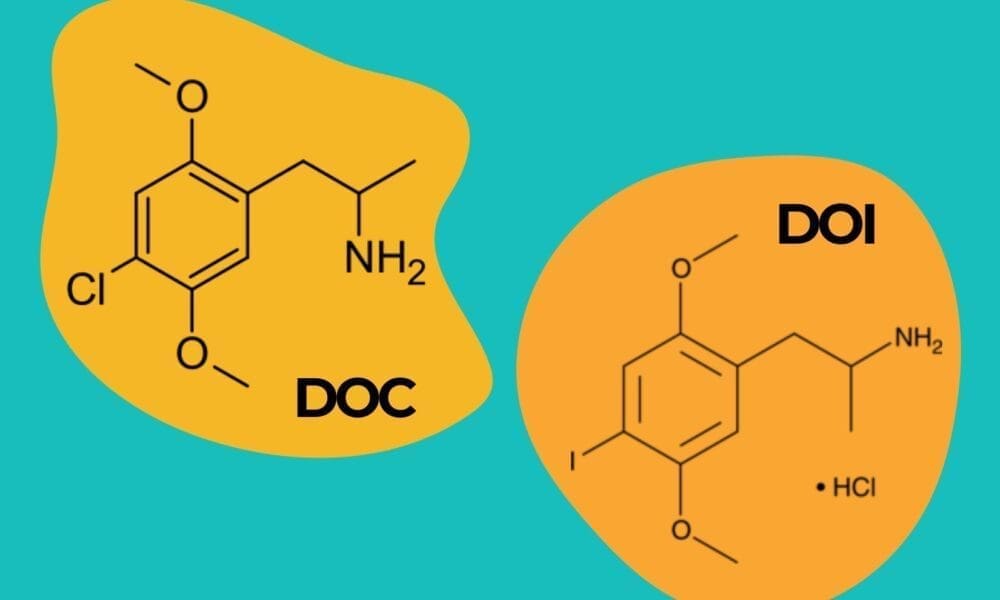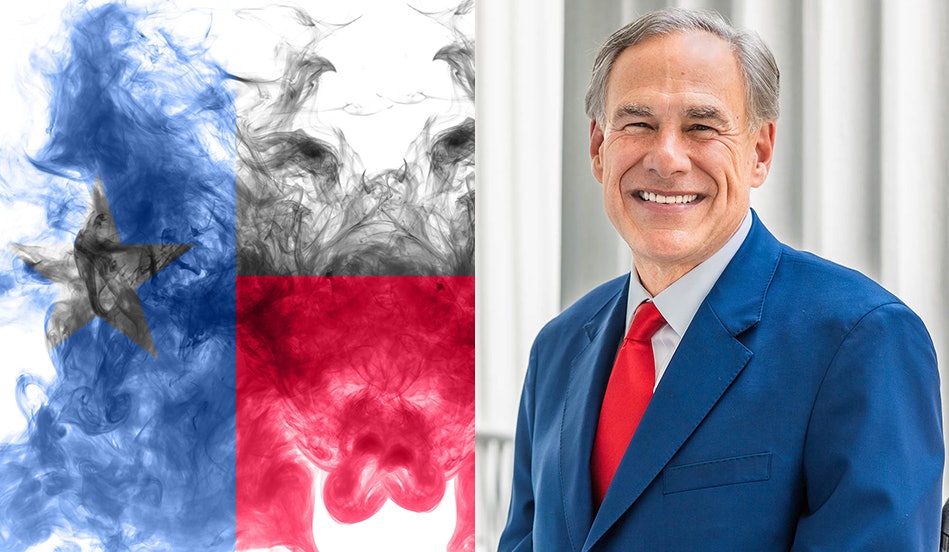featured
Letting Marijuana Users Have Guns Poses ‘A Clear Danger,’ Trump’s Solicitor General Tells Supreme Court
Published
9 hours agoon

In a recent filing with the U.S. Supreme Court, the Trump-led Department of Justice (DOJ) is doubling down on arguments made under former President Joe Biden that users of illegal drugs—including marijuana—”pose a clear danger of misusing firearms.”
That risk, DOJ contends, justifies the longstanding federal prohibition on gun ownership by drug consumers—known as Section 922(g)(3)—despite the Constitution’s broad Second Amendment protections.
In a petition for review by the high court, U.S. Solicitor General D. John Sauer argues that despite recent appeals court decisions calling the constitutionality of the firearms ban into question, the restriction is nevertheless lawful.
“Section 922(g)(3) complies with the Second Amendment,” the government’s June 2 filing in the case, U.S. v. Hemani, says. “That provision targets a category of persons who pose a clear danger of misusing firearms: habitual users of unlawful drugs.”
Some lower courts have said the government’s blanket ban on gun and ammunition possession infringes on the Second Amendment—at least as applied to certain individual cases—because there’s no historical justification for such a broad restriction on an entire category of people.
But in the appeal petition in Hemani, Trump’s solicitor general said the ban is necessary and narrowly tailored enough to survive the legal challenge.
The federal statute “bars their possession of firearms only temporarily and leaves it within their power to lift the restriction at any time; anyone who stops habitually using illegal drugs can resume possessing firearms.”
Notably, while the government mentions “habitual” users of illegal drugs 40 times in its filing, that word does not itself appear in 922(g)(3). The language of the statute prohibits anyone “who is an unlawful user of or addicted to any controlled substance” from purchasing or possessing firearms or ammunition.
A reply brief from Hemani’s lawyers is due to the Supreme Court by July 21.
While DOJ is asking the high court to take up the Hemani case, at least two other, similar cases are waiting in the wings: U.S. v. Cooper and U.S. v. Baxter both of which also hinge on the constitutionality of 922(g)(3).
In Cooper, an Eighth Circuit U.S. Court of Appeals panel dismissed a three-year prison sentence against a person convicted for possession of a firearm while being an active user of marijuana. Judges in that case ruled that government’s prohibition on gun ownership by drug users is justified only in certain circumstances—not always.
“Nothing in our tradition allows disarmament simply because [the defendant] belongs to a category of people, drug users, that Congress has categorically deemed dangerous,” their ruling said.
In Baxter, the Eighth Circuit ruled 922(g)(3) unconstitutional as applied to the facts in the case.
Judges in that case wrote that there were insufficient factual findings in the record “for this Court to review Baxter’s as-applied Second Amendment challenge.” Nevertheless, the they wrote, “We reverse the district court’s ruling on Baxter’s as-applied Second Amendment challenge and remand to the district court for further proceedings consistent with this opinion.”
In recent weeks, the government has sought further time from the court to decide whether to seek an appeal in the other cases. And when DOJ filed its appeal in Cooper, it further asked the court to slow walk the case, requesting justices “hold the petition for a writ of certiorari pending the disposition of the petition in United States v. Hemani…and should then dispose of this petition as appropriate.”
One reason DOJ could be focused on the high court taking up Hemani in particular is that the defendant is not only a cannabis user but also a user of cocaine who’s sold drugs in the past, perhaps reasoning that he is a less sympathetic face of drug consumers’ gun rights. Defendants in the other cases were merely found in possession of both a firearm and marijuana.
If the Supreme Court takes up Hemani and declares 922(g)(3) constitutional, such a ruling could could mean government wins in the remaining cases.
One risk to the government appealing the lower court rulings are that if the Supreme Court does take the case, justices may in fact rule unfavorably to the government, possibly cementing that § 922(g)(3) is—in at least some cases—unconstitutional.
A number of federal courts in recent months have cast doubt on the legality of § 922(g)(3), finding generally that while the ban on gun ownership among drug users may not be entirely unconstitutional, there’s scant historical precedent for such a broad restriction of Second Amendment rights on an entire a category of people.
Earlier this year, for example, a federal judge in Rhode Island ruled that the ban was unconstitutional as applied to two defendants, writing that the government failed to establish that the “sweeping” prohibition against gun ownership by marijuana users was grounded in historical precedent.
In another case earlier this year, a Fifth Circuit panel ruled that the firearms ban was unconstitutional as applied to least one defendant. That ruling came on the heels of a string of other judicial decisions casting doubt on the legality of the ban.
A federal judge in El Paso, for instance, ruled late last year that the government’s ongoing ban on gun ownership by habitual marijuana users is unconstitutional in the case of a defendant who earlier pleaded guilty to the criminal charge. The court allowed the man to withdraw the plea and ordered that the indictment against him be dismissed.
Another panel of judges, on the U.S. Court of Appeals for the Tenth Circuit, heard oral arguments in November in the government’s appeal of a district court ruling that deemed the gun ban unconstitutional.
Much of the panel’s discussion at oral argument in that case surrounded whether the underlying dispute was a facial challenge to the gun ban or an as-applied challenge. And, as in other cases, judges zeroed in on whether or not that defendant was actually under the influence of marijuana while in possession of a firearm.
In a separate federal court case, Department of Justice (DOJ) lawyers recently made arguments that the ongoing firearm restriction for cannabis users is “analogous to laws disarming the intoxicated” and other historical laws “disarming many disparate groups that the government believed presented a danger with firearms.”
That brief was the latest response to a case filed by a Pennsylvania prosecutor who’s suing the federal government over its ban on gun ownership by cannabis users. It came two weeks after lawyers for the official, Warren County District Attorney Robert Greene, asked the U.S. District Court for the Western District of Pennsylvania to allow the matter to proceed to trial.
In a number of the ongoing cases, DOJ has argued that the prohibition on gun ownership by marijuana users is also supported by a recent U.S. Supreme Court decision, U.S. v. Rahimi, that upheld the government’s ability to limit the Second Amendment rights of people with domestic violence restraining orders.
DOJ has made such arguments, for example, in favor of the firearms ban in a case in a case in the U.S. Court of Appeals for the Eleventh Circuit. In that matter, a group of Florida medical cannabis patients contends that their Second Amendment rights are being violated because they cannot lawfully buy firearms so long as they are using cannabis as medicine, despite acting in compliance with state law.
DOJ under President Joe Biden consistently argued that medical marijuana patients who possess firearms “endanger public safety,” “pose a greater risk of suicide” and are more likely to commit crimes “to fund their drug habit.”
It remains unclear how the Trump administration will approach the cases. At a NRA conference in 2023, Trump suggested there might be a link between the use of “genetically engineered” marijuana and mass shootings. He listed a number of controversial and unproven factors that he said at the time he would direct the Food and Drug Administration (FDA) to investigate as possibly causing the ongoing scourge of mass shooting afflicting the country.
“We have to look at whether common psychiatric drugs, as well as genetically engineered cannabis and other narcotics, are causing psychotic breaks” that lead to gun violence, he said.
DOJ has claimed in multiple federal cases over the past several years that the statute banning cannabis consumers from owning or possessing guns is constitutional because it’s consistent with the nation’s history of disarming “dangerous” individuals.
In 2023, for example, the Justice Department told the U.S. Court of Appeals for the Third Circuit that historical precedent “comfortably” supports the restriction. Cannabis consumers with guns pose a unique danger to society, the Biden administration claimed, in part because they’re “unlikely” to store their weapon properly.
Last year, Biden’s son Hunter was convicted by a federal jury of violating statute by buying and possessing a gun while an active user of crack cocaine. Two Republican congressmen challenged the basis of that conviction, with one pointing out that there are “millions of marijuana users” who own guns but should not be prosecuted.
The situation has caused confusion among medical marijuana patients, state lawmakers and advocacy groups, among others. The National Rifle Association’s (NRA) lobbying arm said recently that the court rulings on the cannabis and guns issue have “led to a confusing regulatory landscape” that have impacted Americans’ Second Amendment rights.
“Marijuana use is no longer limited to the domain of indigenous religious customs or youth-oriented counterculture and now includes a wide variety of people who use it for medicinal or recreational reasons,” said the advocacy group, which does not have an official stance on cannabis policy generally. “Many of these individuals are otherwise law-abiding and productive members of their communities and want to exercise their right to keep and bear arms.”
Meanwhile, some states have passed their own laws either further restricting or attempting to preserve gun rights as they relate to marijuana. Recently, for example, a Pennsylvania lawmaker introduced a bill meant to remove state barriers to medical marijuana patients carrying firearms.
Colorado activists also attempted to qualify an initiative for November’s ballot that would have protected the Second Amendment rights of marijuana consumers in that state, but the campaign’s signature-gathering drive ultimately fell short.
As 2024 drew to a close, the ATF issued a warning to Kentucky residents that, if they choose to participate in the state’s medical marijuana program that’s set to launch imminently, they will be prohibited from buying or possessing firearms under federal law.
The official said that while people who already own firearms aren’t “expected to” turn them over if they become state-legal cannabis patients, those who “wish to follow federal law and not be in violation of it” must “make the decision to divest themselves of those firearms.”
Since then, bipartisan state lawmakers have introduced legislation that would urge Kentucky’s representatives in Congress to amend federal law to clarify that users of medical marijuana may legally possess firearms, though no action has since been taken on that bill.
Kentucky Gov. Andy Beshear (D) said in January that he supported the legislature’s effort to urge the state’s congressional delegation to call for federal reforms to protect the Second Amendment rights of medical marijuana patients, but the governor added that he’d like to see even more sweeping change on the federal level.
“I think the right way to deal with that is not just to focus on that issue, but to change the schedule of marijuana,” Beshear said at a press conference. “What we need to change is the overall marijuana policy by the federal government.”

Author: mscannabiz.com
MScannaBIZ for all you Mississippi Cannabis News and Information.
You may like
-


Texas becomes the 40th medical cannabis state!
-


Texas GOP Governor ‘Wants To Legalize Recreational Marijuana,’ Lieutenant Governor Claims
-


DEA Judge Sides With Agency On Proposal To Ban Two Psychedelics Despite Challenge From Scientific Researchers
-


Texas Governor Vetoes Ban on Hemp Products, Calls For Special Session to Regulate THC
-


5-6 Men Under Influence Of ‘Marijuana’ Assault, Molest Woman In Broad Daylight In Bengaluru
-


What is Leafly’s queer staff smoking this Pride?
featured
Texas GOP Governor ‘Wants To Legalize Recreational Marijuana,’ Lieutenant Governor Claims
Published
31 minutes agoon
June 23, 2025
The governor of Texas “wants to legalize recreational marijuana,” the second highest official in the state said following the veto of a bill that would’ve banned hemp products containing THC—while implying that Gov. Greg Abbott (R) lied about his motivations for blocking the prohibition and recommending an alternative regulatory framework instead.
In a somewhat surprising rebuke of Abbott, the lieutenant governor held a press briefing on Monday where he sharply criticized his counterpart over the veto and related proclamation where he put forward various recommendations for regulating hemp. At several points, Lt. Gov. Dan Patrick (R) explicitly accused the governor of wanting to legalize adult-use cannabis because he rejected the hemp legislation.
“It puzzles me why my friend Greg Abbott—Governor Abbott—would at the last minute, at about 22 minutes after [11:00PM CT], decided to veto this bill,” the lieutenant governor said, referring to the midnight deadline for the governor to act on the bill on Sunday. “I know he gave the reasons in his proclamation, but our team simply doesn’t agree with those reasons.”
“One can only come to this conclusion, which surprises me: The governor of the state of Texas wants to legalize recreational marijuana in Texas,” he said. “That’s the headline, folks. Because that’s what his proclamation does now—whether it’s unintentional and he didn’t think through it, or whether it’s intentional—that’s the result of the veto.”
“Again, what Governor Abbott proposes is for us to legalize marijuana in Texas by regulating it,” Patrick said.
Taking questions from reporters, the lieutenant governor expressly challenged the governor to “put out a statement that you do not want to legalize marijuana for adults in the state of Texas, because that’s what either by default you’re doing or on purpose you’re doing.”
He also challenged the underlying legal argument Abbott described in his veto message, explaining that the federal law that legalized hemp provides that states can take steps to enact more restrictive regulations and he disputed the governor’s position that the law would ultimately be nullified in court due to litigation.
“Since when did we care who sued us when we passed a bill?” he said.
“What the federal law says is we can ban it. The only thing we can’t do is stop transportation through the state. You know, he actually mentions that in his proclamation,” Patrick said. “He mentions that one of the problems with this bill is about stopping transportation—but he didn’t write the entire sentence. He’s a lawyer, not me. It says you can’t pass a bill to ban transportation through a state.”
“That’s not what he wrote [about the state’s medical marijuana] program,” he said, referring to separate legislation to expand the state’s medical cannabis law that Abbott approved over the weekend. “He signed that bill. That’s worthless now.”
“What puzzled me was, the last time I talked to the governor in the Capitol before session, he said, ‘Don’t worry about the bill.’ He said, ‘Your bill is fine.’ That’s what he told me in front of witnesses,” the lieutenant governor said. “In fact, he asked a couple of lawyers on my staff—he said, ‘Can you give me some answers I can give because, when I sign this, I need some answers to give.’ So what happened? Who convinced him? On the staff, on the outside, to kill Senate Bill 3?”
It should be noted that, while the lieutenant governor is evidently irate over the veto and leveling accusations that Abbott is tacitly endorsing adult-use legalization, the governor had made clear he opposes that reform—and he’s even pushed back against local efforts to simply decriminalize cannabis for adults.
In his veto message, the governor did say that, rather than outright ban consumable hemp products, lawmakers should establish a regulatory framework that treats cannabinoids “similar to the way alcohol is regulated.”
Abbott proposed an extensive list of policy changes that he says he would support—and which the legislature will have the chance to enact during a special session the governor is convening next month.
“Legislators could consider a structure similar to the way alcohol is regulated, with strict enforcement by an agency like the Texas Alcoholic Beverage Commission,” he said, adding a list of recommended policies he wants to see lawmakers adopt that include age restrictions, zoning requirements and bans on public consumption.
Abbott on Sunday called a special session of a legislature to begin on July 21, saying in a press release that SB 3 and other vetoed bills would be placed on the agenda for further consideration.
Hemp advocates and stakeholders had delivered more than 100,000 petition signatures asking Abbott to veto the measure. Critics of the bill argued that the industry—which employs an estimated 53,000 people—would be decimated if the measure became law.
Texas lawmakers legalized the sale of consumable hemp in 2019, following enactment of the 2018 federal Farm Bill, which legalized the plant nationwide. That’s led to an explosion of products—including edibles, drinks, vape products and cured flower—sold by an estimated 8,000 retailers.
Military veterans advocates, including Texas Veterans of Foreign Wars, have also called on the governor to veto the hemp ban, saying it “would cause irreversible harm to communities across the state.”
Farmers have also said the prohibition would devastate a key sector of the state’s agriculture industry.
Meanwhile, a recent survey from a GOP pollster affiliated with President Donald Trump showed that Texas Democratic and Republican voters are unified in their opposition to the hemp ban bill.
Another poll commissioned the Texas Hemp Business Council (THBC) found that Texas Republican primary voters oppose the proposal.
On Saturday, the governor signed bill to significantly expand the state’s medical marijuana program with new qualifying conditions additional product forms and more dispensary locations.
—
Marijuana Moment is tracking hundreds of cannabis, psychedelics and drug policy bills in state legislatures and Congress this year. Patreon supporters pledging at least $25/month get access to our interactive maps, charts and hearing calendar so they don’t miss any developments.![]()
Learn more about our marijuana bill tracker and become a supporter on Patreon to get access.
—
Abbott separately signed a bill into law this month to create a state-backed research consortium to conduct clinical trials on ibogaine as a possible treatment for substance use disorders and other mental health conditions. The ultimate goal of the project is to develop the psychedelic into a prescription drug with federal Food and Drug Administration (FDA) approval, with the state retaining a portion of the profit.
The measure expands the state’s list of medical cannabis qualifying conditions to include chronic pain, traumatic brain injury (TBI), Crohn’s disease and other inflammatory bowel diseases, while also allowing end-of-life patients in palliative or hospice care to use marijuana.
Separately in Texas, a House committee approved a Senate-passed bill last month that would prohibit cities from putting any citizen initiative on local ballots that would decriminalize marijuana or other controlled substances—as several localities have already done despite lawsuits from the state attorney general.
Under the proposal, state law would be amended to say that local entities “may not place an item on a ballot, including a municipal charter or charter amendment, that would provide that the local entity will not fully enforce” state drug laws.
While several courts have previously upheld local cannabis decriminalization laws, an appellate court comprised of three conservative justices appointed by the governor has recently pushed back against two of those rulings, siding with the state in its legal challenge to the marijuana policy in Austin and San Marcos.
Despite the ongoing litigation and advancement of the House and Senate bills, Texas activists have their targets set on yet another city, Kyle, where they hope put an initiative before voters to enact local marijuana reform at the ballot this coming November.
A recent poll found that four in five Texas voters want to see marijuana legalized in some form, and most also want to see regulations around cannabis relaxed.
Alabama Cannabis Regulators Grant Medical Marijuana Testing License To Foley-Based Lab
Photo courtesy of Chris Wallis // Side Pocket Images.

Author: mscannabiz.com
MScannaBIZ for all you Mississippi Cannabis News and Information.
featured
DEA Judge Sides With Agency On Proposal To Ban Two Psychedelics Despite Challenge From Scientific Researchers
Published
2 hours agoon
June 23, 2025
A Drug Enforcement Administration judge has formally sided with the agency in its attempt to ban two psychedelic compounds that researchers say hold significant therapeutic potential, recommending that they be placed in Schedule I of the Controlled Substances Act (CSA).
In a ruling on Friday, DEA Administrative Law Judge (ALJ) Paul Soeffing said he advised the agency to move forward with its plan to place the psychedelics—2,5-dimethoxy-4-iodoamphetamine (DOI) and 2,5-dimethoxy-4-chloroamphetamine (DOC)—in Schedule I.
This follows administrative hearings where researchers and advocates, including Panacea Plant Sciences (PPS) and Students for Sensible Drug Policy (SSDP), have fought against DEA to ensure that the psychedelics can continue to be utilized in research.
But in the 118-page ruling, Soeffing ultimately said that “the record contains substantial evidence regarding the eight factors required for consideration under 21 U.S.C. § 811(c) to support recommending the scheduling of DOI and DOC,” referring to an administrative standard for determining the health risks and benefits of substances before when placing them in the CSA.
“Furthermore, I find that the record contains substantial evidence regarding the three factors required for consideration under 21 U.S.C. § 812(b)(1) to support recommending the placement of DOI and DOC in Schedule I,” he said, adding that the fact that the United Nations put DOC specifically on its own controlled substances list justifies its prohibition.
The bulk of the recommendation, which must be approved by the DEA administrator before potentially being codified, recounts the competing arguments between DEA and organizations opposing the scheduling action. But this ruling could reignite an ongoing legal challenge that PPS levied against the agency, challenging the fundamental constitutionality of the ALJ proceedings in drug scheduling rulemaking.
“It’s not a surprise that a DEA employee would side with the DEA,” PPS CEO David Heldreth told Marijuana Moment on Friday. “We find that the supposed impartiality of the judge is highly questionable due to that, and we plan to appeal this ruling and continue our lawsuit against the DEA.”
SSDP was among stakeholders who requested the psychedelics hearing in the first place, in hopes of challenging what they view as a lack of evidence justifying DEA’s proposed ban. Researchers have pointed out that DOI and DOC, as currently unscheduled substances, have been key components in psychedelics research that show potential in the treatment of anxiety and depression, for example.
Researchers have also argued that DEA has failed to meet the statutory burden of demonstrating that either psychedelic compound has high abuse potential. There are no documented cases in medical literature of “distressing responses or death” related to human consumption of DOI, nor has there been any established evidence of a high risk of dependence, SSDP said in a pre-hearing filing in July.
The initial scheduling of the administrative hearing on DOI and DOC came about two months after a federal court dismissed the case challenging the constitutionality of DEA’s process for adjudicating scheduling actions as the agency has pursued the ban the two psychedelic compounds.
DEA first attempted to ban DOI and DOC in 2022, only to withdraw the proposal amid pushback from the scientific community. The agency separately withdrew from a proposal to ban five different tryptamine psychedelics in 2022.
In 2023, DEA announced that it would be trying to enact the DOC and DOI ban again. The agency’s notice about the scheduling proposal still lacks evidence that directly connects the compounds to serious adverse health events or demonstrated a high abuse potential.
“To date, there are no reports of distressing responses or death associated with DOI in medical literature,” it said. “The physiological dependence liability of DOI and DOC in animals and humans is not reported in scientific and medical literature.”
DEA said that anecdotal reports posted by people online signaled that the substances have hallucinogenic effects, making it “reasonable to assume that DOI and DOC have substantial capability to be a hazard to the health of the user and to the safety of the community.”
It did point to one report of a death of a person who had used DOC in combination with two other unspecified drugs—as well as two reports of hospitalizations that it said were attributable to the use of DOC with other drugs—but scientists say that hardly constitutes reason enough to place them in the most strictly controlled schedule.
Kat Murti, executive director of SSDP, said in a press release on Monday that the timing of the DEA ALJ’s new recommendations, which coincided with World Psychedelics Day, is “no coincidence.”
“The DEA has relied on similar shady tricks throughout this process—such as announcing their intent to schedule these substances during the winter holidays in 2023 after withdrawing their 2022 attempt, which SSDP also opposed,” she said. “Their strategy throughout has been to try to sneak this ruling by unnoticed because they know the American public and anyone who cares about public health is on our side.”
“DOI and DOC are crucial tools for understanding how serotonin works in the body,” Murti said. “By adding them to Schedule I, the DEA is forcing medical science into the dark ages.”
Alaina Jaster, who has a PhD in pharmacology and Toxicology and serves as co-chair of SSDP’s Science Policy Committee, said the DEA judge’s decision is “disappointing and the almost 120-page record seems to reflect a very different reality than the one I experienced on the stand” when testifying in the case.
“Despite the stipulations of fact that themselves state there is no documented use of DOI, no deaths or overdose, no diversion, and it’s impossible to know whether anecdotal reports which the DEA rely upon actually contain DOI, the administrative judge has recommended placing DOI/DOC in schedule I,” she said. “As someone who has extensively studied the pharmacodynamics and pharmacokinetics of DOI and related psychedelics, it’s baffling to me that the government is going after DOI/DOC.”
In the background of this latest development, proceedings on a proposed rule to move marijuana from Schedule I to Schedule III have stalled amid challenges from witnesses in the administrative hearings. Those hearings are being overseen by a different DEA ALJ, John Mulrooney.
Amid the stalled marijuana rescheduling process that’s carried over from the last presidential administration, congressional researchers are reiterating that lawmakers could enact the reform themselves with “greater speed and flexibility” if they so choose, while potentially avoiding judicial challenges.
Meanwhile, last month a Senate committee advanced the confirmation of Terrance Cole to become the administrator of DEA amid the ongoing review of a marijuana rescheduling proposal that he’s refused to commit to enacting.
Cole—who has previously voiced concerns about the dangers of marijuana and linked its use to higher suicide risk among youth—said he would “give the matter careful consideration after consulting with appropriate personnel within the Drug Enforcement Administration, familiarizing myself with the current status of the regulatory process, and reviewing all relevant information.”
However, during an in-person hearing before the Judiciary Committee in April, he said examining the rescheduling proposal will be “one of my first priorities” if he was confirmed for the role, saying it’s “time to move forward” on the stalled process—but again without clarifying what end result he would like to see.
“I’m not familiar exactly where we are, but I know the process has been delayed numerous times—and it’s time to move forward,” he said at the time. “I need to understand more where [agencies] are and look at the science behind it and listen to the experts and really understand where they are in the process.”
Cole also said he feels it’s appropriate to form a “working group” to look at the federal-state marijuana law disconnect in order to “stay ahead of it.”
Read the DEA ALJ’s ruling and recommendation on the psychedelics ban below:
Image courtesy of Students for Sensible Drug Policy.

Author: mscannabiz.com
MScannaBIZ for all you Mississippi Cannabis News and Information.
featured
Texas Governor Vetoes Ban on Hemp Products, Calls For Special Session to Regulate THC
Published
3 hours agoon
June 23, 2025
Consumable hemp products containing THC or other intoxicating cannabinoids will remain legal under Texas law after Gov. Greg Abbott vetoed Senate Bill 3 on June 22—the last day for executive action on bills.
The legislation, spearheaded by Lt. Gov. Dan Patrick, would have led to the demise of an $8-billion industry that employs some 50,000 workers at roughly 8,000 Texas businesses that manufacture or sell hemp-derived products like delta-8 THC gummies and THCA liquid diamond vapes. Only nonintoxicating CBD and CBD would have remained legal under Patrick’s plan.
However, Abbott suggested in his veto proclamation that while S.B. 3 was “well-intentioned,” it would never go into effect because of constitutional challenges.
“Litigation challenging the bill has already been filed, and the legal defects in the bill are undeniable,” Abbott wrote. “If I were to allow Senate Bill 3 to become law, its enforcement would be enjoined for years, leaving existing abuse unaddressed. Texas cannot afford to wait.”
While the governor signed 1,155 bills that the Texas Legislature passed this legislative session, S.B. 3 was one of the 28 bills he vetoed; however, Abbott identified S.B. 3 as one of five bills that will be placed on the agenda for the upcoming special legislative session next month for further consideration.
As a former Texas Supreme Court justice and the state’s former attorney general, Abbott said his conclusion of S.B. 3 is not speculative. He compared it to an Arkansas bill that Gov. Sarah Huckabee Sanders signed in April 2023 to ban intoxicating hemp products. A federal judge blocked the Arkansas ban in September 2023, and the law has remained dormant as legal proceedings unfold.
While the 2018 Farm Bill, which federally legalized hemp, allows states to enact more stringent regulations surrounding the plant, Abbott called into question whether states can recriminalize hemp-related acts that conflict with federal law.
“I know that Senate Bill 3 is vulnerable to the same legal attacks [as in Arkansas],” the governor wrote. “At worst, Senate Bill 3 would be permanently invalidated by the courts; at best, its implementation would be delayed for years as the case winds its way through the legal system. We can do better.”
By vetoing S.B. 3, Abbott sided with more than 150,000 petition signers who urged the governor to veto the legislation over the supermajority of Texas legislators who backed the bill, as well as law enforcement officials who called for his signature. The petition signers included veterans, business owners, farmers, industry leaders, and, perhaps more importantly, Texas voters.
Jonathan Miller, general counsel at industry advocacy organization U.S. Hemp Roundtable, said the governor’s veto sends a clear national message that “blanket” hemp bans are bad policy.
“Last night’s gubernatorial veto of hemp-killing S.B. 3 in Texas should prove to be a seminal moment for hemp farmers and businesses across the country,” Miller said in a statement provided to Cannabis Business Times. “Members of Congress, governors and state legislators must take notice that hemp bans are not only bad policy, but they are also deeply unpopular, even among the most conservative voters in a red state like Texas.”
With the Texas special session scheduled to begin July 21, Miller said the “correct” response is for lawmakers to regulate hemp products over a “misguided prohibition.”
State lawmakers who backed S.B. 3 did so in the name of public health and safety concerns, suggesting that Texas’ youth had unfettered access to intoxicating products in smoke shops, gas stations and convenience stores. Patrick, who championed the bill as the presiding officer in the Texas Senate, continued to push for support for S.B. 3 even after its passage, suggesting in a May 28 press conference that hemp product manufacturers and retailers “are people that want to kill your kids. And they don’t give a damn.”
However, Patrick’s own experience visiting Austin-based hemp retailer Happy Cactus was very different just a few months ago, when he was carded and did not find any products with noncompliant serving sizes.
Patrick, who could become a political opponent who challenges Abbott’s pursuit of a fourth gubernatorial term in 2026, took issue with the governor’s veto
“Throughout the legislative session, @GregAbbott_TX remained totally silent on Senate Bill 3, the bill that would have banned dangerous THC products in Texas,” Patrick wrote June 23 on X. “His late-night veto, on an issue supported by 105 of 108 Republicans in the Legislature, strongly backed by law enforcement, many in the medical and education communities, and the families who have seen their loved ones’ lives destroyed by these very dangerous drugs, leaves them feeling abandoned. I feel especially bad for those who testified and poured their hearts out on their tragic losses. I will have much more to say at a press conference tomorrow in Austin.”
This represents a U-turn from May 28, when Patrick told reporters, “I’m not worried about the governor. I speak with the governor every day.”
Patrick also called a reporter’s question “stupid” that day when the lieutenant governor was pressed on the idea of more tightly regulating consumable hemp products over prohibition. “That’s crazy talk,” Patrick said.
After Patrick’s May 28 press conference, Lukas Gilkey, the CEO of Austin-based consumer-packaged goods brand Hometown Hero, accused the lieutenant governor of “spitting out lies” after Patrick held up a package of the company’s cereal bites, claiming “no one knows what’s in it.”
Gilkey posted a video on social media on that same day, explaining the product’s package had 10 individually wrapped pieces containing 20 milligrams of delta-9 THC, with a full list of ingredients on the back and a QR code for the certificate of analysis.
“[He’s] just spitting out lies like he always does,” Gilkey said. “He just held up one of our products, this exact product, and said it had 6,000 milligrams [of THC], which it does not. … It is very clearly stated what this is: 20 milligrams delta-9 THC and 20 milligrams CBD per piece. … There’s a COA, per state law in Texas, because this is a regulated product.”
In addition to prohibiting the manufacture and sale of hemp products with even trace amounts of THC, S.B. 3 would have made it a third-degree felony to deliver or possess with intent to deliver consumable hemp products with intoxicating cannabinoids. It would also be a third-degree felony to falsify laboratory reports or to possess, manufacture or sell the products without a license or registration.
Those convicted of third-degree felonies in Texas face two to 10 years imprisonment and up to a $10,000 fine. Under current Texas law, possessing 4 ounces or less of cannabis is a misdemeanor with the possibility of up to one year behind bars.
In Sunday night’s veto proclamation, Abbott called S.B. 3’s language a legal problem, as the 2018 Farm Bill defines hemp as containing no more than 0.3% delta-9 THC on a dry-weigh basis during a pre-harvest field test. The federal legislation does not regulate finished goods. The U.S. Ninth and Fourth Circuit courts ruled this definition to be “unambiguous.”
“[S.B. 3] criminalizes what Congress expressly legalized and puts federal and state law on a collision course: Today, federal law promises Texas farmers that they may grow hemp without fear of criminal liability,” Abbott wrote. “But under Senate Bill 3, the seeds used to grow those plants are ‘consumable products’—currently available in stores—and they naturally contain cannabinoids. What’s a Texas farmer to do? Trust the federal government’s promise, or fear criminal liability from the state?”
As passed by the Texas Legislature, S.B. 3 would not only have been a criminal entrapment for Texas farmers, but it would have also criminalized “innocent” Texans, Abbot said, referring to pharmacists stocking health supplements, veterans treating post-traumatic stress disorder, and parents caring for epileptic children with medicine approved by the U.S. Food and Drug Administration.
Facing a potential “lengthy” legal battle, Abbott said S.B. 3 would have resulted in consequences opposite of its intent. Instead, the governor called on lawmakers to go back to the drawing board to craft a regulatory framework that protects public safety while also aligning with federal law.
The governor provided a sample list of 19 potential regulations that could work, including many suggestions that would more closely align the state’s hemp regulations with those of alcohol. The sample list is viewable here.
“Passing a law is not the same thing as actually solving a problem,” Abbott wrote. “Texas needs a bill that is enforceable and will make our communities safer today, rather than years from now.”

Author: mscannabiz.com
MScannaBIZ for all you Mississippi Cannabis News and Information.

Texas becomes the 40th medical cannabis state!

Texas GOP Governor ‘Wants To Legalize Recreational Marijuana,’ Lieutenant Governor Claims

DEA Judge Sides With Agency On Proposal To Ban Two Psychedelics Despite Challenge From Scientific Researchers

Texas Governor Vetoes Ban on Hemp Products, Calls For Special Session to Regulate THC

5-6 Men Under Influence Of ‘Marijuana’ Assault, Molest Woman In Broad Daylight In Bengaluru

What is Leafly’s queer staff smoking this Pride?

Colorado Gov. Announces Pardons for Psychedelics Possession

Video: Johnny Bananas partners with Cincinnati’s King City Gardens for cannabis gummies

Texas Governor Tells Lawmakers To Regulate Hemp THC Products Like Alcohol After Vetoing Bill To Ban Most Consumable Cannabinoids

Jones Soda Co. Divests Cannabis Beverage Business for $3 Million

Texas Gov. Vetoes THC Ban, Signs Medical Cannabis Expansions Bill

Letting Marijuana Users Have Guns Poses ‘A Clear Danger,’ Trump’s Solicitor General Tells Supreme Court

Cannabis banking not an urgent priority, GOP Senate sponsor says (Newsletter: June 23, 2025)

Texas Governor Vetoes Bill To Ban Hemp Products With Any THC Following Forceful Pushback From Industry, Veterans And More

Marijuana trafficking operation results in two arrests, sheriff’s department says

Pennsylvania Democrats frustrated over stalled marijuana legalization bill in budget battle: This Week in Pennsylvania

Alabama Cannabis Regulators Grant Medical Marijuana Testing License To Foley-Based Lab

Texas Expands Patients’ Access to Medical Cannabis

Missouri Marijuana Officials Are Reviewing Rules On Purchase Limits For Medical Patients

Will Pennsylvania lawmakers legalize marijuana? Top lawmaker shares insight

Study links marijuana use to higher heart attack and stroke risk

Medical Marijuana Event Brings Awareness, Products, and Support | Video

Bill to make changes to Ohio's recreational marijuana laws stalls again

Northern Colorado man arrested, accused of selling marijuana to minors

Alert: Department of Cannabis Control updates data dashboards with full data for 2023

Connecticut Appoints The US’s First Cannabis Ombudsperson – Yes there is a pun in there and I’m Sure Erin Kirk Is Going To Hear It More Than Once!

5 best CBD creams of 2024 by Leafly

Free delta-9 gummies from Bay Smokes
New Study Analyzes the Effects of THCV, CBD on Weight Loss

EU initiative begins bid to open access to psychedelic therapies

Mississippi city official pleads guilty to selling fake CBD products

Curaleaf Start Process Of Getting Their Claws Into The UK’s National Health System – With Former MP (Resigned Today 30/5/24) As The Front Man

May 2024 Leafly HighLight: Pink Runtz strain

5 best autoflower seed banks of 2024 by Leafly

Horn Lake denies cannabis dispensary request to allow sale of drug paraphernalia and Sunday sales | News

Discover New York’s dankest cannabis brands [September 2024]

Nevada CCB to Accept Applications for Cannabis Establishments in White Pine County – “Only one cultivation and one production license will be awarded in White Pine County”

Press Release: CANNRA Calls for Farm Bill to Clarify Existing State Authority to Regulate Hemp Products

Local medical cannabis dispensary reacts to MSDH pulling Rapid Analytics License – WLBT

6 best CBD gummies of 2024 by Leafly

5 best THC drinks of 2024 by Leafly

The Daily Hit: October 2, 2024

5 best delta-9 THC gummies of 2024 by Leafly

People In This State Googled ‘Medical Marijuana’ The Most, Study Shows

Weekly Update: Monday, May 13, 2024 including, New Guide for Renewals & May Board meeting application deadline

Thailand: Pro-cannabis advocates rally ahead of the government’s plan to recriminalize the plant

PRESS RELEASE : Justice Department Submits Proposed Regulation to Reschedule Marijuana

Press Release: May 9, STIIIZY and Healing Urban Barrios hosted an Expungement Clinic & Second Chance Resource Fair
Trending
-

 California Cannabis Updates1 year ago
California Cannabis Updates1 year agoAlert: Department of Cannabis Control updates data dashboards with full data for 2023
-

 Breaking News1 year ago
Breaking News1 year agoConnecticut Appoints The US’s First Cannabis Ombudsperson – Yes there is a pun in there and I’m Sure Erin Kirk Is Going To Hear It More Than Once!
-

 best list11 months ago
best list11 months ago5 best CBD creams of 2024 by Leafly
-

 Bay Smokes12 months ago
Bay Smokes12 months agoFree delta-9 gummies from Bay Smokes
-

 cbd1 year ago
cbd1 year agoNew Study Analyzes the Effects of THCV, CBD on Weight Loss
-

 Business9 months ago
Business9 months agoEU initiative begins bid to open access to psychedelic therapies
-

 Mississippi Cannabis News1 year ago
Mississippi Cannabis News1 year agoMississippi city official pleads guilty to selling fake CBD products
-

 Breaking News1 year ago
Breaking News1 year agoCuraleaf Start Process Of Getting Their Claws Into The UK’s National Health System – With Former MP (Resigned Today 30/5/24) As The Front Man



